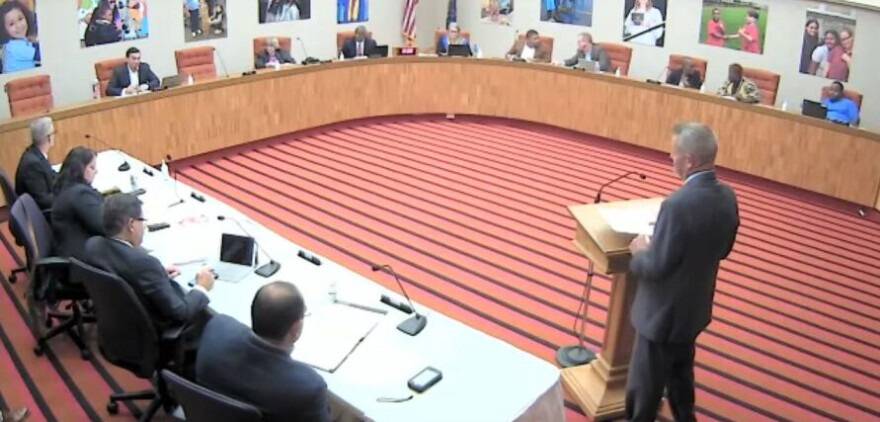ALLENTOWN, Pa. - Allentown School Board ousted Superintendent John Stanford on Thursday after a contentious debate played out in a public vote.
The board approved a separation agreement dated Oct. 20, to become effective Oct. 28. Board Vice President Lisa Conover said Stanford will receive a severance of up to nine months of his $230,000 salary.
Stanford declined to speak with reporters after the meeting.
The vote was 6 to 3, with members Lisa Conover, LaTarsha Brown and Patrick Palmer voting no. Audrey Mathison, Nick Miller, Phoebe Harris, Jennifer Lynn Ortiz and Nancy Wilt voted yes.
Earlier this week, the board was in the process of negotiating a severance package with him.
The vote was not listed on Thursday’s agenda. Board member Phoebe Harris said the board only reached an agreement that morning.
The continued turnover of Allentown School District’s top administrator
Here’s what led to the changes over the past decade:
- August 2011: Dr. Gerald Zahorchak, the former Pennsylvania education secretary, steps down just one year into a five-year contract. His tenure, although short, was considerably rocky as the district laid off more than 100 teachers and focused on cutting costs. Deputy Superintendent, Dr. Russell Mayo, is appointed acting superintendent.
- May 2016: Dr. Mayo announces he won’t seek a new contract and will leave ASD in June 2017. The move allows the school board to begin a search for his replacement.
- December 2016: Thomas E. Parker is named superintendent, becoming the first minority to hold the position. He arrives with experience in various leadership roles, including superintendent of a school district in Ecorse, Michigan. He also previously worked as a principal and teacher in Detroit. He officially takes over at ASD in July 2017.
- February 2021: Parker submits a notice of resignation to the school board, effective May 1.
- April 2021: The board approves the appointment of Dr. Marilyn Martinez as interim superintendent at a special meeting.
- July 2021: Martinez submits her resignation and the board names Jennifer Ramos as acting superintendent, effective July 28.
- September 2021: The board shares that an offer has been extended to Dr. John D. Stanford to be the next superintendent. The board president says Stanford is “an exceptional candidate who possesses the right combination of skills, experience and background to lead the Allentown School District well into the future.”
- October 2022: Sources with knowledge of the talks say the school board is negotiating a separation package for Stanford. He’s just one year into a five-year contract, with a salary of $230,000.
The school board appears to not have a timeline for negotiations, but a string of controversies has shaken its confidence in Stanford, said sources who spoke to LehighValleyNews.com on the condition of anonymity. Days later, the board votes on the separation agreement, which passes by a vote of 6-3.
The vote was added to the agenda moments after the start of the meeting by a 6-to-3 vote, with Conover, Brown and Palmer again voting no.
Emotional pleas
Stanford appeared to grow emotional as students pleaded with the board not to let him go.
Several of the students were attending their first board meeting, as they were being voted in as student representatives to various board committees. Many said Stanford was the only superintendent they'd ever met in person.
“This is the only superintendent that I’ve seen at my basketball games,” Dieruff High School senior Eliana Rios said. "I just vote no because this is the one man who I’ve seen be involved with the students, be involved with the staff, be involved with the community.”
Many of the meeting attendees who spoke up asked for clarification on why the board was letting Stanford go.
Board members didn't cite a reason.
Dan Bosket with the Allentown NAACP told the board the superintendent has its support.
“We are not taking this lightly,” Bosket said. "We believe he has put his all in serving as superintendent."
Conover spoke out forcefully against the decision to cut ties with Stanford.
“This man did nothing to be removed,” Conover said.
She confirmed the board had taken a vote of no-confidence in executive session in the days leading up to the public vote on Thursday. Such a vote could have violated the state Open Meetings Law.
Paula Knudsen Burke, an attorney with the Reporters Committee for Freedom of the Press, said the law requires official action to take place in public.
“Making a decision about lacking confidence in the superintendent and taking a vote on that is [an] official action,” Burke said. “I’m struggling to understand what exception allows them to go into an executive session, take a vote outside of the public and not have that deliberation in front of the public.”
In a statement, school attorney Jeffrey Sultanik called the decision mutual and said the board of directors wants to be clear that there has been no professional misconduct or impropriety.
In that statement, Stanford thanked the Allentown students, team members and community for a wonderful experience.
Sultanik also confirmed that school board members signed a non-disclosure agreement he said was part of the separation and release agreement. He said it was mutually negotiated.
- The vote to remove Stanford was 6-3
- The board did not give a reason for parting ways with Stanford
- Students spoke emotionally about Stanford in a plea to change board members' minds
Superintendent criticism
Stanford has been Allentown Schools superintendent for less than a year, beginning work on the district’s top job in November 2021. He signed a five-year contract running through June 2026 with an annual salary of $230,000.
He is Allentown’s fifth superintendent since 2010 and also the district’s second Black superintendent after Thomas Parker. Stanford succeeded Parker, who left last year for a position in Michigan.
Stanford's salary is the highest the district has ever paid. It’s $55,000 more than Parker was paid while on the job. All board members voted in favor of that amount at that time, saying they needed to pay more to get the best person in the position.
“This man did nothing to be removed."Lisa Conover, Allentown School Board vice-president
District administration scrutiny
The ASD administration has come under scrutiny recently, including last month after a 14-year-old student with a loaded semi-automatic handgun was arrested inside William Allen High School. The school district did not disclose that an armed student was taken into custody during the lockdown, only acknowledging it after Lehigh County District Attorney Jim Martin released the information to the public nearly a week later.
Stanford defended keeping the information from parents at a subsequent school board meeting in late September, saying it was best practice to tell families to check with the police department for more information.
“You should talk to the city about their actions and the decisions that they made,” he said at the time. “All I can tell you is the decisions we made were consistent with best practices in a crisis situation because, again, we were being told it was an ongoing investigation.”
Stanford also has faced criticism for hiring Allen High School Principal Cheryl Clark, who is the first Black woman to serve in the role. Some parents objected to the way Clark disciplined disruptive students early in the school year. Students started a petition calling for her removal, and it got more than 4,400 signatures.
Stanford also came under fire for adding more administrative positions during the last budget cycle. Stanford argued then that reorganizing the central office would provide teachers with the support they needed in their individual schools.


